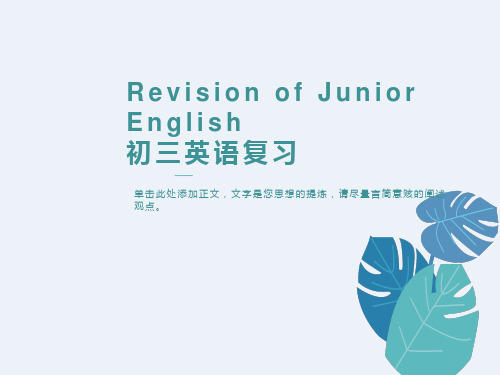初中英语语法课件
合集下载
初中英语语法大全课件

(1)构成名词的后缀常用的有-ence,-(e)r/ -or (从事某事的人),-ese (某地人),-ess (雌性),-ful (一……),-ian (精通……的人),-ist (专业人员),-ment (性质;状态),-ness (性质;状态),-tion(动作;过程)等。例如: differ不同于→difference区别 write写→writer作家 Japan日本→Japanese日本人 act表演→actress女演员 mouth口→mouthful一口 music音乐→musician音乐家 racial种族的----racialist种族主义者
01
合成形容词
02
名词+形容词snow-white雪白的
03
名词+现在分词English-speaking讲英语的
04
名词+to+名词face-to-face面对面的
05
名词+过去分词man-made人造的
06
数词+名词one-way单行的
07
数词+名词+形容词two-year-old两岁的
动词转化为名词
很多动词可以转化为名词,大多意思没有多大的变化(如下①);有时意思有一定变化(如下②);有的与一个动词和不定冠词构成短语,表示一个动作(如下③)。例如:
Let's go out for a walk.我们到外面去散散步吧。
He is a man of strong build.他是一个体格健壮的汉子。
构成副词的常用后缀有-ly (主要用于形容词之后表示方式或程度),-ward(s) (主要用于表示方位的词之后表示方向)。
例如:
angry生气的→angrily生气地
to到→towards朝……,向……
初中英语语法课件ppt

03
Opposite Meanings Adjectives
When using Opposite Meanings Adjectives, place the stronger
one first For example, "big and small."
The Usage of Advantageous
The use of connections
Coordinating Connections
Connections like "and", "but", "or" are used to coordinate two or more independent clauses, e.g., "I like apples, but my brother doesn't"
Subordinating Connections
Connections like "because", "if", "when" are used to introduce sub border clauses, e.g., "I will go to the park because it's sunny today"
Last Simple Tense
Used to express an action that occurred in the past Example: "She walked to school yesterday."
The tense of verbs
Present Continuous Tense
初中英语语法课件

Personal pronouns, possessive pronouns, and reflexive pronouns
• Personal pronouns: Personal pronouns refer to pronouns that replace people or things, including first person, second person, and third person pronouns. The first person pronouns include "I" and "we", the second person pronouns include "you" and "you", and the third person pronouns include "he", "she", "it", "they", etc.
points
01
noun
What is a noun?
Nouns are words used to represent names of people,
things, places, or abstract concepts.
Nouns can be divided into two categories: proper nouns and common nouns.
02
verb
Definition of verbs
01
02
Verb: A part of speech that expresses behavior, action, state, or existence.
初中英语语法大全课件

Lucy sings (the) best of all.
He is the most careful among us.
在表示 “和······一样······” 和 “不及······” 这类概念时,可以用 “as+原级+as” 和 “not as(so)+原级+as”的句型
Our teacher is as busy as before.
alone(单独、独自)作表语=by oneself lonely(孤独的)可作表语、定语 He lived alone, but he didn’t feel lonely. It’s a lonely village. hard(努力地) hardly(几乎不)否定副词 She works very hard, and he hardly has a rest on Sundays.
“the + 比较级,the + 比较级”
01
The more, the better.
03
The busier he is, the happier he feels.
05
表示“ 越······就越······ ”
02
越多越好。
04
他越忙越高兴。
06
“ more (less) than ”表示
4.The box is too heavy for him to carry.
PART 01
Exercises
选择 ( )1 Who gets home usually ____ in your family? A. the latest B. later C. early D. as late ( )2 The more we looked at the picture, ____. A. we like it less B. the less we liked it C. better we liked it D. it looked better ( )3 What a pity. Lucy ran ____ than Lily. A. a few more slowly B. a little more slowly C. much more slowly D. little slowlier
初中英语零基础学语法--英语句子结构 课件(共43张PPT)

附属成分
基本成分的修饰语。可以是: • 定语:即用来修饰名词的单词、短语或从句 • 状语:即用来修饰名词或代词以外的词的单词、短语或从句。
定语
Poor John tottered toward a hospital nearby. She likes oranges imported from the USA.
省略成分
句中被省略的成分,虽然未说出来,却在句中表示 一定的意思:
(You) Come here. (I wish you)Good luck! Some gave him praises,but others(gave him)rotten eggs.
He runs as fast as, if ( he does ) not ( run ) faster, than you. ( I ) Hope you like it. John should clean the room today and Peter ( should clean it ) tomorrow.
主语、动词(不及物动词、及物动词、双宾动词、系动词、宾 补动词)、宾语及补语可以称为基本句子成分。完整的句子一 般至少包含2个基本成分,至多4个基本成分。
Vi(不及物动词)
主 语
谓 语
Vt(及物动词)
宾语 宾语(直) 宾语(间) 宾语 宾补
系动词
表语
be / feel / seem / look appear / stand / lie become /get / grow / turn go / come / remain/ keep taste / smell etc.
连接成分
连接成分实际上是一个连词,用来连接两个或几个平行的词、
初中英语语法大全课件

A comprehensive courseware on middle school Englis
目录
CONTENTS
• Noun • Article • Pronoun • Subjects and advertisements • Verb • Preparation • Connection • Sentence types
02
Article
The usage of define articles
Summary
This section covers the rules and examples of define article usage in English grammar
Index article usage in singular nouns
Personal pronouns
I
Used as the subject of a verb
You
used as the object of a verb or position
He/She
used as the subject or object of a verb or position
They
Use the index article "some" before Plural Nouns that are not countable, such as "bread" or "water" For countable regular nouns, use "a" or "an" depending on the noun's starting sound
目录
CONTENTS
• Noun • Article • Pronoun • Subjects and advertisements • Verb • Preparation • Connection • Sentence types
02
Article
The usage of define articles
Summary
This section covers the rules and examples of define article usage in English grammar
Index article usage in singular nouns
Personal pronouns
I
Used as the subject of a verb
You
used as the object of a verb or position
He/She
used as the subject or object of a verb or position
They
Use the index article "some" before Plural Nouns that are not countable, such as "bread" or "water" For countable regular nouns, use "a" or "an" depending on the noun's starting sound
中考英语语法 代词 课件 (共43张PPT)

Байду номын сангаас
4.指示代词:表示时间和空间远近关系的代词叫指 示代词。见下表
指示代词可在句中作主语、宾语、表语、定语等。例如: Those are my parents. (作主语) Throw it like that. (作表语) The toys little Tom likes are those in the basket. (作表语) These pictures are drawn by an old blind man. (作定语)
③人称代词 she 可以用指代祖国、大地、月亮、轮船等。 例 如:The ship is leaving. She’s on her first trip to Boston. 轮船要起航了。 这时她第一次去波士顿。 We love our country, we hope she’ll be stronger and stronger. 我们热爱我们的祖国,我们希望她越来越强大。 ④It 作为人称代词时,可以表示天气、距离、时间、环境等。 例如:It is about 10 kilometres from here. 离这儿大约有 10 公里。
注意:①人称代词 we, you, they 可以用来表示一般人。例如: You cannot go into the hall with slippers. 不准穿拖鞋进入大厅。 ②人称代的主格作表语,一般都在正中的谈话中, 表示强调。 例如:It was he who took away the necklace. 是他拿走了那条 项链。
05
练习
1.This isn’t ______ pencil case. I left ______ at home.
A. my, mine
4.指示代词:表示时间和空间远近关系的代词叫指 示代词。见下表
指示代词可在句中作主语、宾语、表语、定语等。例如: Those are my parents. (作主语) Throw it like that. (作表语) The toys little Tom likes are those in the basket. (作表语) These pictures are drawn by an old blind man. (作定语)
③人称代词 she 可以用指代祖国、大地、月亮、轮船等。 例 如:The ship is leaving. She’s on her first trip to Boston. 轮船要起航了。 这时她第一次去波士顿。 We love our country, we hope she’ll be stronger and stronger. 我们热爱我们的祖国,我们希望她越来越强大。 ④It 作为人称代词时,可以表示天气、距离、时间、环境等。 例如:It is about 10 kilometres from here. 离这儿大约有 10 公里。
注意:①人称代词 we, you, they 可以用来表示一般人。例如: You cannot go into the hall with slippers. 不准穿拖鞋进入大厅。 ②人称代的主格作表语,一般都在正中的谈话中, 表示强调。 例如:It was he who took away the necklace. 是他拿走了那条 项链。
05
练习
1.This isn’t ______ pencil case. I left ______ at home.
A. my, mine
初中英语语法课件ppt

vacation together.
过去将来时的使用:
一、过去将来时表示对于过去某一时间而言将要发生的动 作或存在的状态。 would或was /were going to + V
would可用于各种人称。
二、would +V还可表示过去的习惯动作,在这点上同used to同义。
When we were children, we would/used to go swimming every summer.
e) 用于条件从句“如果……想,设想”(接近if ……want to,或 if ……should) 例:Greater efforts to increase agricultural production must be made if food shortage ____________ avoided. A) is to be B) can be C) will be D) has been
一般现在时的动词形式: 动词原形 1.am;is ;are 2.have,has 3.第三人称单数形式-(e)s
肯定句:I watch television every day.
否定句:I don’t watch television every day.
疑问句:Do you watch television every day.
一般现在时的使用:
1.一般现在时表示总是、通常、习惯 性的动作或状态。
It snows in winter. I watch television every day.
2.用于对客观事实的普遍性的陈述。
Water consists of hydrogen and oxygen. Most animals kill only for food. The world is round.
过去将来时的使用:
一、过去将来时表示对于过去某一时间而言将要发生的动 作或存在的状态。 would或was /were going to + V
would可用于各种人称。
二、would +V还可表示过去的习惯动作,在这点上同used to同义。
When we were children, we would/used to go swimming every summer.
e) 用于条件从句“如果……想,设想”(接近if ……want to,或 if ……should) 例:Greater efforts to increase agricultural production must be made if food shortage ____________ avoided. A) is to be B) can be C) will be D) has been
一般现在时的动词形式: 动词原形 1.am;is ;are 2.have,has 3.第三人称单数形式-(e)s
肯定句:I watch television every day.
否定句:I don’t watch television every day.
疑问句:Do you watch television every day.
一般现在时的使用:
1.一般现在时表示总是、通常、习惯 性的动作或状态。
It snows in winter. I watch television every day.
2.用于对客观事实的普遍性的陈述。
Water consists of hydrogen and oxygen. Most animals kill only for food. The world is round.
- 1、下载文档前请自行甄别文档内容的完整性,平台不提供额外的编辑、内容补充、找答案等附加服务。
- 2、"仅部分预览"的文档,不可在线预览部分如存在完整性等问题,可反馈申请退款(可完整预览的文档不适用该条件!)。
- 3、如文档侵犯您的权益,请联系客服反馈,我们会尽快为您处理(人工客服工作时间:9:00-18:30)。
特殊疑问句举例:What did he do yesterday? When did he get up this morning?
注意:He has opened the door.(表示过去“开门”的动作对现在的影响是 门还开着)He opened the door.(不能确定门现在是否开着)
精选课件
精选课件
14
一般将来时的使用:
1、 基本结构是will / shall do。 例:We shall send her a glass hand-made craft as her birthday gift.(我们将送给她一个玻璃的手工制品,作为给她 的生日礼物。)
2、 有些动词,如:arrive, be close, come, do, done, go, have, leave, open, play, return, sleep, start, stay等,用于一般 进行时,并且通常与一个表示将来时间的时间状语连用,可以 表示将来时。 例:My mother is coming to visit me next week and is staying here until May.(我妈妈下周将来看我,并会呆到5月。)
精选课件
15
3、 表示“打算去……,要……”时,可用be going to do。 例:This is just what I am going to say.(这正是我想说 的。)
4、 表示“即将、正要”时,可用be about to do。强调近期 内或马上要做的事。 例:Don't worry, I am about to make a close examination on you.(别担心,我马上就给你做一次仔细的检查。)
动词构成:动词过去时(--ed) listen—listened study---studied stop-----stopped come----came
精选课件
9
否定构成:didn’t+动原 didn’t work used not (didn’t use) to
work
一般疑问构成及简答举例:Did+主语+动原+其它?
动词构成: 1. will/shall+动原 2.am/is/are going to+动词原型 3. am/is/are(about)+动词不定式 4. am/is/are+coming等现在分词
以work为例:will/shall work
am/is/are going to work
am/is/are(about) to work am/is/are coming/leaving…
一般现在时的动词形式: 动词原形 1.am;is ;are 2.have,has 3.第三人称单数形式-(e)s
精选课件
3
肯定句:I watch television every day.
否定句:I don’t watch television every day.
疑问句:Do you watch television every day.
I didn’t walk to school yesterday.
Did you walk to school yesterday ?
精选课件
12
用法:将来会出现或发生的动作
常用时间状语:this evening, tomorrow, next month, in a few minutes, at the end of this term
Welcome !
精选课件
1
Outline
过去
1 .一般现在时 2 .一般过去时 3 .一般将来时 4 .过去将来时: 5 .过去进行时: 6. 过去完成时 7. 现在进行时: 8. 现在完成时:
现在
精选课件
将来
2
用法: 经常性的和习惯性的动作
常用时间状语 : usually, sometimes, in spring, every day, in the morning
10
一般过去时的使用:
1.一般过去时表示一个动作或情况在过去 某个的时间开始和结束.
I walked to school yesterday. I bought a new car tnow
精选课件
11
2.表示过去经常性的动作或情况。 I often got up at 6:00 last year.
精选课件
7
3.某些动词的一般现在时表示说话时正在 存在的一种情况。
I have only a dollar right now. He needs a pen right now.
注:这些动词不能用于进行时。
精选课件
8
用法:过去时间发生的或过去经常性的动作
常用时间状语: yesterday, last night, two days ago, in 2000, at that time, before ,when 等引导的含 过去时的句子。
精选课件
5
一般现在时的使用:
1.一般现在时表示总是、通常、习惯 性的动作或状态。
It snows in winter. I watch television every day.
精选课件
6
2.用于对客观事实的普遍性的陈述。
Water consists of hydrogen and oxygen. Most animals kill only for food. The world is round.
注意: start, leave, go, come等的一般现在时可表示按规定要发生的未 来动作,如列车将离开。客观真理在从句中也用一般现在时.
精选课件
4
Examples:
It snows in winter. It doesn’t snow in winter. Does it snow in winter?
精选课件
13
否定构成:will/shall not… am/is/are not…
特殊疑问句举例:What will you do tomorrow? When are we going to have a class meeting?
注意:在if条件或as soon as等时间状语从句中用一般现在时代替一般将来时。
注意:He has opened the door.(表示过去“开门”的动作对现在的影响是 门还开着)He opened the door.(不能确定门现在是否开着)
精选课件
精选课件
14
一般将来时的使用:
1、 基本结构是will / shall do。 例:We shall send her a glass hand-made craft as her birthday gift.(我们将送给她一个玻璃的手工制品,作为给她 的生日礼物。)
2、 有些动词,如:arrive, be close, come, do, done, go, have, leave, open, play, return, sleep, start, stay等,用于一般 进行时,并且通常与一个表示将来时间的时间状语连用,可以 表示将来时。 例:My mother is coming to visit me next week and is staying here until May.(我妈妈下周将来看我,并会呆到5月。)
精选课件
15
3、 表示“打算去……,要……”时,可用be going to do。 例:This is just what I am going to say.(这正是我想说 的。)
4、 表示“即将、正要”时,可用be about to do。强调近期 内或马上要做的事。 例:Don't worry, I am about to make a close examination on you.(别担心,我马上就给你做一次仔细的检查。)
动词构成:动词过去时(--ed) listen—listened study---studied stop-----stopped come----came
精选课件
9
否定构成:didn’t+动原 didn’t work used not (didn’t use) to
work
一般疑问构成及简答举例:Did+主语+动原+其它?
动词构成: 1. will/shall+动原 2.am/is/are going to+动词原型 3. am/is/are(about)+动词不定式 4. am/is/are+coming等现在分词
以work为例:will/shall work
am/is/are going to work
am/is/are(about) to work am/is/are coming/leaving…
一般现在时的动词形式: 动词原形 1.am;is ;are 2.have,has 3.第三人称单数形式-(e)s
精选课件
3
肯定句:I watch television every day.
否定句:I don’t watch television every day.
疑问句:Do you watch television every day.
I didn’t walk to school yesterday.
Did you walk to school yesterday ?
精选课件
12
用法:将来会出现或发生的动作
常用时间状语:this evening, tomorrow, next month, in a few minutes, at the end of this term
Welcome !
精选课件
1
Outline
过去
1 .一般现在时 2 .一般过去时 3 .一般将来时 4 .过去将来时: 5 .过去进行时: 6. 过去完成时 7. 现在进行时: 8. 现在完成时:
现在
精选课件
将来
2
用法: 经常性的和习惯性的动作
常用时间状语 : usually, sometimes, in spring, every day, in the morning
10
一般过去时的使用:
1.一般过去时表示一个动作或情况在过去 某个的时间开始和结束.
I walked to school yesterday. I bought a new car tnow
精选课件
11
2.表示过去经常性的动作或情况。 I often got up at 6:00 last year.
精选课件
7
3.某些动词的一般现在时表示说话时正在 存在的一种情况。
I have only a dollar right now. He needs a pen right now.
注:这些动词不能用于进行时。
精选课件
8
用法:过去时间发生的或过去经常性的动作
常用时间状语: yesterday, last night, two days ago, in 2000, at that time, before ,when 等引导的含 过去时的句子。
精选课件
5
一般现在时的使用:
1.一般现在时表示总是、通常、习惯 性的动作或状态。
It snows in winter. I watch television every day.
精选课件
6
2.用于对客观事实的普遍性的陈述。
Water consists of hydrogen and oxygen. Most animals kill only for food. The world is round.
注意: start, leave, go, come等的一般现在时可表示按规定要发生的未 来动作,如列车将离开。客观真理在从句中也用一般现在时.
精选课件
4
Examples:
It snows in winter. It doesn’t snow in winter. Does it snow in winter?
精选课件
13
否定构成:will/shall not… am/is/are not…
特殊疑问句举例:What will you do tomorrow? When are we going to have a class meeting?
注意:在if条件或as soon as等时间状语从句中用一般现在时代替一般将来时。
